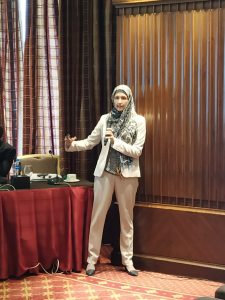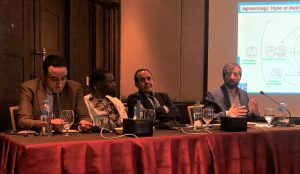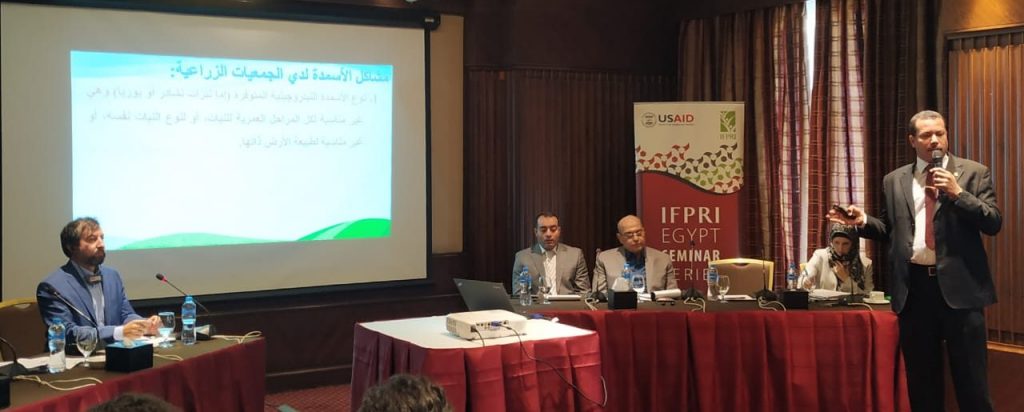Dalia Elsabbagh and Sikandra Kurdi - IFPRI Egypt
“Fertilizer policy in Egypt and options for improvements” seminar took place in the Conrad Hotel on August 20, 2019 as a part of IFPRI-Egypt seminar series funded by the United States Agency for International Development (USAID).
The seminar aimed to discuss the effects of Egypt’s fertilizer subsidies system in Egypt and its impact on the agriculture output in terms of quantities and nutrition, as well as their medium- and long-term effects on land productivity. In light of the government of Egypt’s effort to move from general subsidies to more targeted support for the people, for example in the area of energy subsidies and social protection, the seminar also focused on discussing alternative policy options that would address fertilizer overuse.
 Sikandra Kurdi, Associate Research Fellow at IFPRI Egypt, presented empirical research which shows the overuse of fertilizers in a sample of farmers in Upper Egypt as a result of the fertilizer subsidy. Kurdi’s results demonstrate that there is an insignificant effect of fertilizer usage increase above the advised levels on Egypt’s crop yield. More specifically, results show that the cost of the additional fertilizers’ usage for wheat is considerably higher than the maximum estimate of the benefit from the additional yield.
Sikandra Kurdi, Associate Research Fellow at IFPRI Egypt, presented empirical research which shows the overuse of fertilizers in a sample of farmers in Upper Egypt as a result of the fertilizer subsidy. Kurdi’s results demonstrate that there is an insignificant effect of fertilizer usage increase above the advised levels on Egypt’s crop yield. More specifically, results show that the cost of the additional fertilizers’ usage for wheat is considerably higher than the maximum estimate of the benefit from the additional yield.
Alsaid Kaoud, Professor at the Faculty of Agriculture Suez University, introduced the main problems associated with fertilizers in Egypt, categorized under problems of usage, markets and suppliers, and supervision. From the usage side, farmers use too much fertilizer and use the wrong types of fertilizers for their crops. Farmers overuse nitrogen fertilizer believing that it might result in higher yield. On the supply side, only 25-30% of the subsidized fertilizer that is supposed to be provided by the cooperatives is available, and is often available too late in the season for optimally timed application. Farmers are also unsure about the quality of the fertilizer they use, both because fertilizer sold on the black market is sometimes diluted or put in mislabeled sacks, and because monitoring of the fertilizer factories is insufficient to ensure quality at the production stage.
Mohamed Kassem, Director at Agricultural Extension and Rural Development Research Institute, agreed on the principal problem of an overuse of nitrogen fertilizer and underuse of phosphates, and described the private sector as both the problem and potentially part of the solution. He noted that farmers overuse fertilizer in reaction to a misconception propagated by the fertilizers' input suppliers that using less fertilizer would risk crop failures. Kassem added that Egypt regards public-private partnerships (PPP) as an alternative for the shrunken public extension system. The advantage of the PPP approach consists of optimizing and raising the agriculture output through knowledge transfer, information dissemination and ameliorating the agriculture supply chain benefiting both farmers and investors. In particular, he mentioned farmer field schools as necessary to convince farmers to change their practices. However, because the private sector has an incentive to encourage overuse of fertilizers, he suggested that the government monitors the fertilizer usage recommendations published by the suppliers.

Atef Sweed, Professor at the Faculty of Agriculture Aswan University, spoke in his capacity as the former quality control manager for Evergrow & Technogreen Specialized Fertilizers. Sweed highlighted that Egypt’s fertilizers production reached about 22 million tons while Egypt consumed 10 million tons of fertilizers in 2017. He noted that the producers of the subsidized nitrogen fertilizers receive 2.5 billion EGP in support from the government and are partially government-owned enterprises. This creates a problem for small fertilizer producers who are unable to compete. On the demand side, he also mentioned a negative feedback loop through which overuse of fertilizers increases the pH of soil and leads to a loss in fertility, causing farmers to apply even more fertilizer. Sweed also highlighted the existence of significant negative effects of fertilizers overuse on the consumer health.
Harrison Charo Karisa, Country Director for Egypt and Nigeria at WorldFish, presented a study demonstrating that integrating agriculture and aquaculture realizes higher economic efficiency than each component separately and lead to a lower usage of fertilizers.
In parallel, Rachid Serraj, Senior Project Officer & Delivery Manager for the Regional Initiative on Small Scale Family Farming at FAO, discussed the agronomics behind optimal levels of fertilizer use. He quoted Norman Borlaug: “Chemical fertilizer is the fuel that has powered the Green Revolution's forward thrust” and showed a figure showing how maize yields over time had responded to increased use of Nitrogen. However, importantly after a certain level, there is a plateau in the yields and increased Nitrogen application does not help anymore. The level of fertilizer’s use in Egypt, he pointed out, is very high relative to the levels at which you would see yield gains. He also mentioned another negative feedback cycle which he had described in his PhD dissertation by which overuse of Nitrogen fertilizer leads to inhibition of the biological process of N-fixation.
In terms of potential solutions, Serraj affirmed that the Government of Egypt and the FAO are currently reviewing the Sustainable Agricultural Development Strategy 2030 (SADS); to improving quality control of agricultural inputs, including fertilizers, and rationalize fertilizer and pesticide use. He recommends going back to traditional practices such as crop rotation with berseem clover and legumes, and the use of manure; highlighting that improved agricultural extensions was necessary to get farmers to return to these practices.

Ahmed Abdelhafez, Lecturer of Soils and Water Science at the Faculty of Agriculture Assiut University, highlighted that the addition of large amounts of mineral fertilizers to the soil results in the accumulation of heavy metals having negative environmental and health impacts. Abdelhafez presented a study on fertilizers effect on soil and health in two locations in Egypt, El-Nubaria and El-Bustan. The study concludes that the over usage of fertilizers over the time reduced the soil yield and had adverse impact on consumer’s health.
There was widespread agreement among the panel that the overuse of Nitrogen fertilizer is a problem for Egyptian agriculture and is driven by a combination of market distortions caused by the subsidy and the moribund extension system. In addition, speakers agreed on several solutions, including:
- Reviving the crop rotation and the Farmer Field Schools for Integrated Crop Management;
- Introducing alternative fertilizers usage in Egypt;
- Monitoring input suppliers more efficiently.
